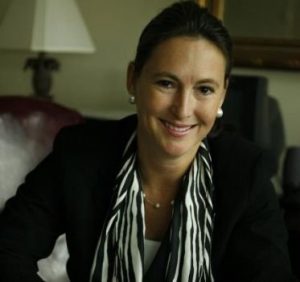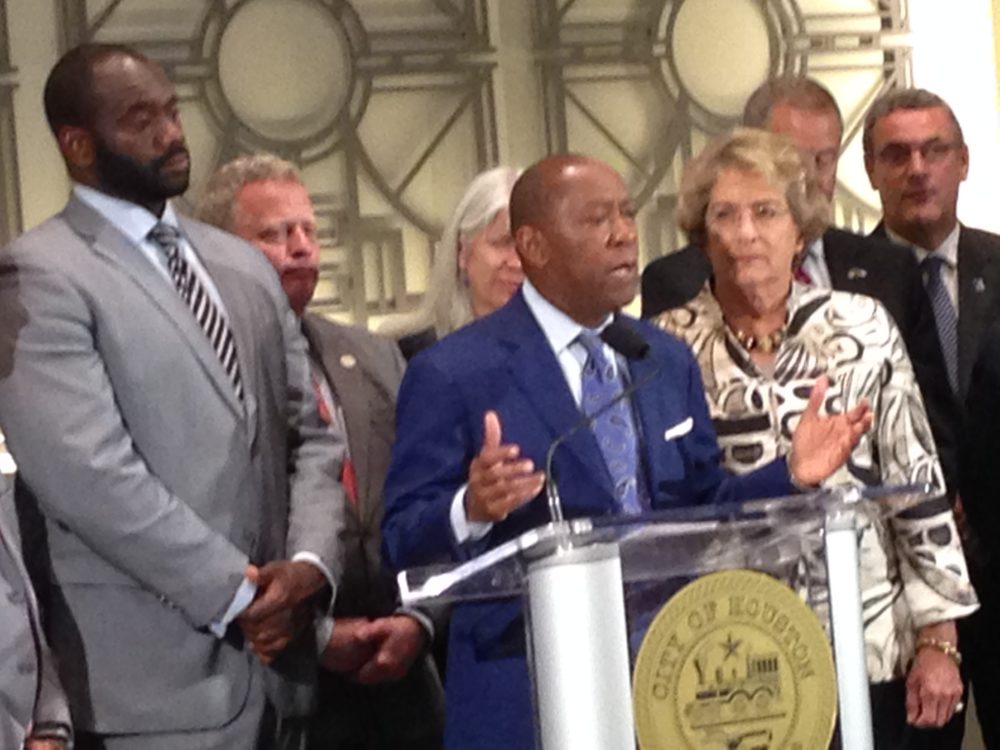Accusations That Trump Is A Racist Do Not Ring True
“I now want to bring forth a friend — well, he is deceptive in that his social style is of such, one can miss his seriousness and commitment to success, which is beyond argument. When we opened this Wall Street project . . . He gave us space at 40 Wall Street, which was to make a statement about our having a presence there.” (1998)
“We need your building skills, your gusto . . . for the people on Wall Street to represent diversity.” (1999)
Thus Jesse Jackson praised Donald Trump at the 1998 and 1999 Rainbow Push Coalition conventions for giving Jackson’s coalition a headquarters building on Wall Street.
In the wake of the media shithole frenzy, the four-flushing phony Jackson is now calling Trump a racist.
On Friday, Isaac Newton Farris Jr., MLK’s nephew, told CNN that Trump is not a racist … well sort of. Here is what he said:
“I don’t think the President Trump is a racist in the traditional sense as we know in this country. I think President Trump is racially ignorant and racially uninformed. But I don’t think he is a racist in the traditional sense.”
Alveda King, MLK’s niece, appeared Monday on ‘Fox and Friends’ and defended Trump in the ‘shithole’ controversy. She praised Trump for his policies from which “African-Americans are benefitting.” She said:.
“Our jobs are going up; our unemployment is going down. Companies are saying they’re gonna raise minimum wage and do bonuses because of the tax cuts, so the president is helping the African-American community, and I don’t believe President Donald John Trump is a racist.”
The Democrats and the mainstream media are hanging onto every word spoken by the president, hoping for an opportunity to destroy his presidency. Unfortunately, Trump’s uncontrollable mouth has given them that opportunity numerous times.
As for the shithole controversy, Haiti and some African countries are shitholes where the masses live in abject poverty while their rulers and their rulers’ associates are rolling in wealth obtained through out-and-out corruption.
I believe that Trump made the shithole remark, but I also believe he is not a racist, in any sense of the word. Trump is a bigot, but then so are the rest of us.
Who needs Jesus when you’ve got Trump?
I bet Franklin Graham, Robert Jeffress and Paula White love this guy.
Mark Lee, a Trump voter and owner of a pest control company, provided Camerota with some insight into what “The Swamp” is, after the CNN anchor pointed out that the administration is stocked with multi-millionaires.
“I love that,” Lee contended. “They’re not politicians.”
“In a capitalist system, you’re allowed to make money,” he continued. “Being rich is good.”
Lee and another Trump voter determined that the Swamp is “the mainstream,” “elites” as well as Congress.
And finally, Lee made a pretty striking declaration regarding his unwavering loyalty to the president:
“If Jesus Christ gets down off the cross and told me Trump is with Russia, I would tell him, ‘Hold on a second. I need to check with the President if it’s true.’”
When Camerota asked him why he believes the president over everyone else, Lee replied “I believe him. He’s a good man. And he’s taken so much shots for us.”
Lee also revealed that he shows up at Mar-a-Lago whenever the president stays at the Florida resort, armed with a “Blacks for Trump” sign.
(via CNN)
Nothing to see here folks. Just another loyal Trump supporter.
https://www.facebook.com/permalink.php?story_fbid=401598483235225&id=100000129373859
https://www.facebook.com/permalink.php?story_fbid=540662985948009&id=100000129373859
https://www.facebook.com/permalink.php?story_fbid=550141611666813&id=100000129373859
Man, ain’t this the truth:
A year into Trump’s presidency, Christians are facing a spiritual reckoning
President Trump is an ultimate and consummate worshiper of money, sex and power. American Christians have not really reckoned with the climate he has created in our country and the spiritual obligation we have to repair it. As a result, the soul of our nation and the integrity of the Christian faith are at risk.
….
Central to the health of our society is for American Christians to rescue an authentic, compassionate and justice-oriented faith from the clutches of partisan abuse, and from the idolatry of money, sex and power. The word “repentance” in Christian, Jewish and Islamic traditions means much more than feeling sorry about the past; it also means “turning around” to equity and healing personally, and systemically in our institutions of policing and criminal justice, education, economics, voting rights, immigration and refugees, racial geography, housing, and more. Making repentance practical is the spiritual task ahead.
Don’t judge Donald Trump? Are you serious?
We must judge Donald Trump.
As I write this early on a Sunday morning, millions of Americans of various faiths are preparing to head to one of the hundreds of thousands of churches in the U.S.A. Many of them are so fearful of a Hillary Clinton presidency that they will be praying that Donald Trump wins the election. They are so fearful of a Hillary Clinton presidency that they have suspended all logic and reason, believing that the new Donald Trump is different from the old Donald Trump of 3, 6, 12, 18 months ago. Or 2, 4, 6, 8, 10, 20 years ago. They have convinced themselves that a 70 year old man’s life history should be ignored by voters because he says that he won’t let them down.
And they will tell me and others like me that we shouldn’t judge Donald Trump because we aren’t God and we don’t know what’s in his heart. That we shouldn’t judge Trump because the Bible tells us that we shouldn’t judge others.
I’ll skip the biblical discussion and let them believe what they want to believe. But have I judged Donald Trump? You bet that I have. And every voter in America should be judging him as well. Elections require us to judge the people running for office. Be they Hillary Clinton or Donald Trump.
I didn’t judge Trump this week, after his bragging about sexual assault was caught on tape. I judged him many months ago, determining that he has no business being President of the United States of America. I judged him and decided that:
- his political philosophy doesn’t match mine
- he is not a Republican
- he cannot beat Hillary Clinton and will drag the entire party down with him
- he is an authoritarian that would prefer to be a dictator and will act like one if elected
- he has no credibility to be commander in chief of our military
- he is a loose cannon that cannot be trusted with nuclear weapons
- he has a zero sum outlook on the world – if he can’t have it, no one can
- he has no sense of morality or common decency
I also decided that I would never vote for Donald Trump and was #neverTrump before there was a hashtag. Ted Cruz was right:
Truer words were never spoken.
Regardless of what you hear and see from your friends on Facebook or in the media, this is not a “binary” election. There are better candidates on your ballot than Hillary Clinton or Donald Trump. I’ll be voting for Gary Johnson. Others will vote for Jill Stein. Still others will write in Evan McMullin. Don’t let anyone fool you into thinking that you have to vote for Trump or Clinton.
And don’t let anyone tell you that you shouldn’t judge Donald Trump. As an American voter, you have a duty to judge all candidates. It’s in the Bible.
DA Debate

Hours before Devon Anderson and Kim Ogg debated last Monday night at Windsor Village United Methodist Church, one of Devon’s lead prosecutors was the subject of prosecutorial misconduct allegations in a Fort Bend County courtroom. Prosecutorial misconduct has become a theme of the Anderson administration.
The DA debate, moderated by Khambrel Marshall from KPRC Local 2, occurred just minutes before 84 million people watched the Trump-Clinton debate. Think about that for a second. The race for Harris County District Attorney is easily the most contested race in the county and the Anderson-Blakemore crew decided to debate Ogg the same night of the most watched political debate in history.

Since the 2014 election, Anderson has been on the defensive for a variety of issues including several prosecutorial misconduct allegations; the [unjust] prosecution of two pro-life activists; a lawsuit that exposed the fact that prosecutors jailed a rape victim; even more jailed witnesses, including another rape victim; misuse of the asset forfeiture process; and a complete lack of diversity in the leadership ranks.
Devon used two defenses to this litany of scandals: personally attacking Kim Ogg and blame shifting.
Anderson attacked Ogg for previously running as a Republican. Anderson also attacked Ogg for voting in the 2008 Harris County Republican Primary. Instead of discussing her own attributes, Anderson tried to point out to the black community that Kim did not vote for Barack Obama in the 2008 primary campaign. Again, an interesting approach for someone defending her own Republican bona fides and one I enjoy sharing with Republican voters.
I do find it interesting that Kim Ogg’s father, former State Senator Jack Ogg, was one of the last pro-life Democrats in Texas. I was wondering if Anderson was going to bring that up; but, she is likely unaware of Houston political history.
Interestingly, Anderson is still defending her office’s decision to jail rape victims. While this does not surprise me, Anderson’s lack of legal responsibility blows me away. Let me explain. Most of you have likely seen Anderson’s video from Arizona defending the actions of her office. Since the news broke, Anderson has provided a detailed description of the trial court prosecutor’s actions. This is a problem because, whether or not they are true, the prosecutor’s actions were likely outside the scope of his employment, which would pierce his governmental immunity. This is why most smart lawyers say, “I cannot comment on pending litigation.” Devon Anderson is not a smart lawyer.
Ogg quoted hard data to demonstrate the lack of racial diversity in leadership positions at the Harris County District Attorney’s Office. Simply said, the racial diversity in the office in no way reflects the ethnic composition of the county.
In addressing the series of prosecutorial misconduct allegations against the District Attorney’s Office, Anderson claimed that none had been substantiated. In actuality, Judge Stacey Bond found that two prosecutors intentionally caused a mistrial in a highly publicized case. Attorney Stanley Schneider said that “Harris County residents should be troubled by the DA’s office condoning conduct like this.” After Bond’s ruling, attorney Dan Cogdell said, “It says to me there’s a cancer in that office that needs to be cut out.”
The latest problems involve destroyed evidence at Precinct Four and Anderson’s failure to timely notify defense counsel. Anderson’s office is a scandal a week and this will continue. She is in way over her head and has gotten terrible political and legal advice from those that surround her.
At one point during the debate, Anderson described her office’s transparency and a large chuckle erupted from the audience. Let’s just take the Precinct Four situation. Instead of accepting responsibility, Anderson shifted blame to Constable Mark Herman. Anderson claimed that her office could not obtain reliable case information from Constable Herman’s office, which is why Anderson’s office waited six months to notify defendants that the evidence in their case was destroyed. Meanwhile, defendants went to prison and, now, defendants may sue the county over these civil rights violations. Once again, the taxpayers lose with Anderson in office.
Anderson is wasting your tax dollars by permitting her prosecutors to exercise bad judgment and unethical conduct. She is also using the entire budget for salaries and is dependent on asset forfeiture funds for everything else.
There are only two ways to view this debate: via Ogg’s Facebook page and KPRC Local 2.
If you watch the debate, you will witness Anderson’s negative personal attacks against Ogg. Anderson’s defensive posture and blame shifting does not warrant Republican support. Most folks agree that Anderson is weighing down the ticket. It is time for the Anderson administration to end. Otherwise, Anderson’s misbehavior will continue as a stain on Harris County Republicans during every election cycle and lead to more problems for years to come. Most importantly, we are not safer with Anderson in office. Violent crime is prominent throughout the county. Anderson was a product of the slates and as Paul Simpson has waged a war against the three prominent slates, he continues to endorse and support the worst candidate in the Republican field, which drags down all of the candidates. Watch the debate and see for yourself.
Harris County Presidential Election of 2016
There is no question that the 2016 election will be talked about for many years to come. This election is unusual for several reasons and the candidacy of Donald Trump has added more stress for Harris County elected officials and candidates. Paul Simpson is doing the greatest Kabuki dance of all time trying to support what is arguably the worst field of candidates in Harris County history. Folks like Devon Anderson, Mary Lou Keel, Mike Sullivan, and Jim Murphy must give every true conservative on the ballot this election cycle tremendous heartburn. At this point, full panic mode is setting in. If you notice, Paul Simpson does not have one nice thing to say about Donald Trump and let me tell you why.
You cannot understand the 2016 race without looking at the 2014 election of Paul Simpson. In that election, Simpson was supported by a coalition of institutional, big government, pro-immigration, establishment Republicans who teamed up with Libertarians and Log Cabin Republicans to defeat Jared Woodfill. Another group of supporters bought into the fallacy that the defeat of Woodfill will bring down the “pay to play” guys (i.e., Hotze, Lowry, and Polland). Of course, the real goal for many Simpson sympathizers was to replace the so called “pay to play” slates with their own “pay to play” slates. Allen Blakemore, of course, has his hand in both camps. See Wayne Smith’s primary defeat.

Simpson’s strategist was Kevin Shuvalov of the Mammoth Group who works for Joe Straus. Think about that for a second. Straus is the establishment Republican whose job is to keep money flowing to contractors, party bosses, police and fire unions, Planned Parenthood, etc. in the Texas Legislature. After two failed campaigns, Simpson turned to Shuvalov’s establishment consulting group in Austin, the Mammoth Group for his 2014 campaign. Following Simpson’s victory, the Mammoth Group basically operates the Harris County Republican Party, and, in turn, the party’s campaign in November. The Mammoth Group works for establishment Republicans and is a reconstituted version of Karl Rove’s old group.
Simpson’s supporter list prohibits him from supporting Trump. Dick Weekley, a big Simpson financial supporter, would punish Paul if he even thought of supporting or helping Trump. Sad but true. It is important to remember that these folks are dependent on cheap foreign labor for their businesses to succeed. This need is juxtaposed against the Trump Train and Mr. Trump’s strong stance against illegal immigration and wasteful government spending. Weekley is not alone and a coalition of political economic opportunists have set their sights on Harris County – the biggest prize in contracting in the state.
The Cruz pity party adds to the crosscurrents of the local political outlook. When Trump defeated Cruz in the Presidential primary, many Cruz supporters in Harris County were disappointed and angry at Trump. Ironically enough, Cruz and Simpson share many supporters. How can Cruz, a man who claims to value the United States Constitution and the legacy of Mr. Justice Scalia, be so shortsighted? What will Cruz say if Hillary is elected and Justice Scalia’s legacy is tarnished by a very liberal court? Cruz and his hurt feelings do not bode well for down-ballot races in Harris County. Cruz’s failure to endorse Donald Trump at the Republican National Convention in Cleveland hurt Harris County Republicans.
 Then, we have Devon Anderson as the District Attorney candidate. Devon’s problems have been well documented by me, David Jennings, The Houston Chronicle, Jace Larson of Channel 2, and just about every news organization in the country. Devon’s problem is the other battlefront in the conservative movement – social conservatives. Devon Anderson’s indictment and prosecution of David Daleiden and Sandra Merritt set off a political firestorm within the pro-life movement. The damage done to the pro-life movement nationally by Devon’s actions may well cost many Harris County Republicans this November. Devon Anderson to this day does not understand the damage she caused the pro-life movement. Social conservatives are rightfully angered by her mere presence on the ballot. See Dr. Hotze’s email to Devon et al. from Saturday night.
Then, we have Devon Anderson as the District Attorney candidate. Devon’s problems have been well documented by me, David Jennings, The Houston Chronicle, Jace Larson of Channel 2, and just about every news organization in the country. Devon’s problem is the other battlefront in the conservative movement – social conservatives. Devon Anderson’s indictment and prosecution of David Daleiden and Sandra Merritt set off a political firestorm within the pro-life movement. The damage done to the pro-life movement nationally by Devon’s actions may well cost many Harris County Republicans this November. Devon Anderson to this day does not understand the damage she caused the pro-life movement. Social conservatives are rightfully angered by her mere presence on the ballot. See Dr. Hotze’s email to Devon et al. from Saturday night.
The fact that our local party officials are running away from Donald Trump is a disaster in the making. When you see Jim Murphy standing with Sylvester Turner supporting Turner’s pension reform plan, Harris County has a problem. Simpson did not want to involve himself with Devon Anderson and the indictment of Daleiden and all candidates will pay a price. With Simpson at the helm, the local party does not stand for life or fiscal conservatism. The pro-immigration issue is not helping much either. Simpson’s Muslim pep rally and recent carnival were symbolic of the utter failure of the local party. Simpson’s reliance on establishment money creates a well-funded local party, but one devoid of principle. The new mantra is pro-life is taboo and fiscal conservatism does not align with their big government contracts.
It kind of makes me miss Jared.
#NeverDevon
- 1
- 2
- 3
- 4
- Next Page »

